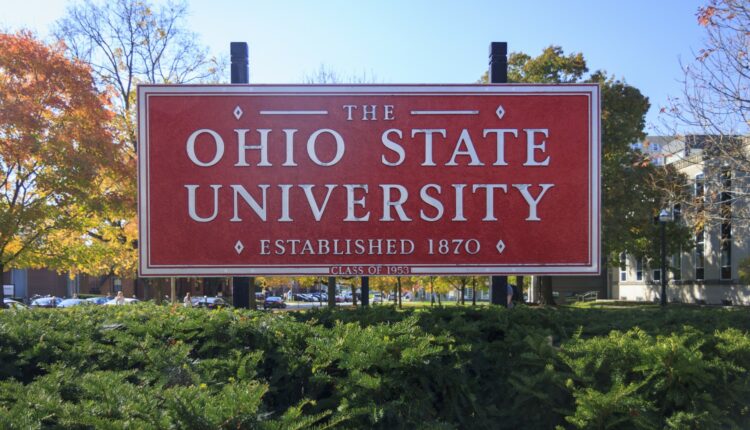Ohio State University’s PhD candidate named 2023 Tillman Scholar
David Hibler felt the call to service at a young age. The Ohio State University PhD candidate was named this week as a 2023 Tillman Scholar, but his career almost took a different direction.
“When I was in high school, I wanted to become a pastor, and I started at 16, taking classes at night in homiletics and hermeneutics, ancient Hebrew, ancient Greek and things like that,” he said. “I originally wanted to become a minister, but I wasn’t exactly sure how that was going to turn out.”
His path led him to Columbus State Community College to study psychology while simultaneously enlisting in the Army as a medic because he continued to feel the call to help others.
“I joined the military and out of all the different specializations that I could have selected, I decided to become a combat medic,” he said. “I was already working in the health care area at Riverside Hospital, and I really enjoyed the ability it gave me to help others.”
Hibler is one of the 60 U.S. service members, veterans and military spouses chosen as Tillman Scholars this year. The program is part of the Pat Tillman Foundation, honoring the former NFL star-turned-Army Ranger.
The Tillman Scholars program supports active duty service members, veterans and military spouses by investing in them through education, lifelong leadership development and a global community of peers and mentors to help them develop as leaders and make an impact at both a local and global scale.
“Selecting a new class of Tillman Scholars and supporting their goals is such a special time for the foundation each year,” said Marie Tillman, board chair and co-founder of the foundation. “It means so much to see them continue to carry Pat’s legacy and values forward, in fields as diverse as medicine, STEM, humanities and engineering. David exemplifies the values and leadership that Pat lived by and we can’t wait to see what he does at Ohio State.”
“It’s pretty incredible. The Tillman Foundation is a very selective group. It’s the most prestigious fellowship that I’ve been accepted to so far,” Hibler said. “Beyond giving me financial support while I’m in school, it has also given me access to a huge amount of resources, especially in networking and getting to meet some of the people that can help me be more effective now and when I’m finally out of school.”
Hibler served in Iraq before he was honorably discharged in January 2013. During his time in the Army, he continued to focus on school and research at Ohio State to improve public health on a global scale. His investment in his education has been extensive.
“When I graduate with my PhD, I’m going to have two Bachelor of Science degrees, a Master of Science, a PhD, a pre-med specialization, a graduate certificate in demography, a graduate interdisciplinary specialization in Wicked Science and another one in global health. So, it’s been a long road here at Ohio State and I have definitely checked off the box of being a lifelong learner.”
His time as a medic in Iraq influenced his research passion. He is completing his doctorate in evolution, ecology and organismal biology, studying the new scientific field of complexity and investigating how the interactions of social groups can affect individuals’ welfare, especially their health.
“My main drive is to use what we’re seeing in complexity science to find better ways to understand how social groups are developing, how that’s affecting the individuals in those groups, and then to combine that with my master’s in public health to examine how we can potentially address public health issues in a better way,” he said.
He said the research touches on fields like public health, medicine, anthropology, evolution, social work, public policy and other fields. Hibler believes it’s an educational experience he could only have received at a campus like Ohio State.
“Without Ohio State, I wouldn’t have had these different minds to be bouncing my ideas off of. Not just the minds, but the different areas of study. Ohio State is a huge fertile ground for the seeds of ideas to be planted in and have them grow and develop into gigantic world-changing trees.”
He also credits the support he has received as a military-connected student. He has seen the support services at Ohio State grow by leaps and bounds in his time as a student. Hibler said he often struggled with the bureaucracy that many veteran students face, from benefits to financial aid to classroom accommodations.
“Now [veteran students] have a community. We have a sense of place, and it gives a lot of us a sense of purpose, which is something that veterans really need after they get out of the military. The support structure here is incredible,” he said.
Hibler is a member of the Major Lawrence Miller Military Community Advocate (MCA) Program to help connect fellow veterans to resources and experiences at Ohio State, and to help veteran students accomplish their new mission of academic and professional success.
His work as an advocate is another opportunity to serve others – a theme that has continued across his career – and he hopes to support MCA-style programs at universities around the country.
“[It] couldn’t have happened if it wasn’t for Ohio State, and especially if it wasn’t for the Military and Veteran Services office that we have now. Ohio State is an incredible and unique place, where students are given the opportunity to change the world. And the support that we (military-students) have from the Military and Veteran Services office is life-changing, and it’s still growing every single year.”

